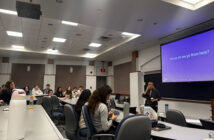
Jordyn Pykon ’23
There is another virus other than COVID-19 that is affecting the population: it is the viral spread of misinformation. On Sept. 23, the World Health Organization declared that it is not only a pandemic we are battling, but an “infodemic.”
An infodemic is a surplus of inaccurate information that is disseminated on and offline. With this misinformation being mostly spread through social media platforms, individuals have been given the opportunity to spread misinformation faster than ever before. In the case of COVID-19, the fallacies spread are often intended to weaken trust between the public and health officials.
Who is to blame for the viral spread of lies? Is it the fault of social media platforms like Twitter and Facebook? Is it the fault of journalists for not reporting objectively and accurately enough? Are government and health officials lacking in their ability to instill trust in our society?
It is easy for us to believe lies and conspiracies because it is in our very human nature to be fearful of the unknown. The pandemic is one of the biggest uncertainties we have faced in the past year and has demonstrated that to not know the future is quite frightening.
I craved a lot of different things during the quarantine: cookies, ice cream and pizza to name a few, but there was nothing I craved more than an answer to the one question we were all asking: when will this end? There was no news outlet or health official that was able to render me a definitive answer.
We were told all different types of information about COVID-19 and yet the information we received was constantly changing. We had health officials tell us to not wear a mask, and then to wear a mask. We had a president who suggested injecting disinfectant into those infected to combat the virus. We’ve heard many different stories about how to battle this pandemic while watching the numbers soar of those infected.
I think many of us now have become skeptical of the information we read and watch. Fact-checking has become a norm for many of us as we question the objectivity of the news platforms we once trusted. Perhaps this will force news outlets to become more accurate in their reporting, cultivating a stronger trust between the public and journalists.
Perhaps it isn’t just news outlets to blame, but the algorithms in which social media platforms use to serve us. For those of us who saw the “Social Dilemma” on Netflix, many of us now know that social media platforms use echo chambers to provide us with information that strengthens our existing beliefs. If we are always reading the information that aligns with our own convictions, how are we to ever expand our opinions and perspectives? The algorithms of social media have fostered the divisiveness that we see in the politics of our country today.
I don’t think it is just news outlets and social media platforms to blame. Perhaps the viral spread of misinformation is the fault of us as a society as we are unable to deal with the feeling of not knowing. However, facing the unknown is a natural part of life. We can always predict things that may happen based on our life experiences, but we can never know the future for certain.
Uncertainty isn’t always a bad thing. Not knowing the future has enabled me to be pleasantly surprised. Uncertainty, I would argue, is a major part of the college experience. Through college, many of us have formed friendships with those we never thought we would meet, attended classes that we thought we would hate but love (and vice versa), and experienced things that we never would have thought we would.
The truth is, there will always be uncertainties we will face in life. It is up to us as a society to figure out the best way to deal with the unexpected. As social media becomes more widely used and advanced, the spread of misinformation is a virus that may intensify over time. However, perhaps if we self-immunize ourselves to the feelings associated with uncertainty through empathy and honesty, we can fight the spread of lies with the spread of truth.





Comment policy
Comments posted to The Brown and White website are reviewed by a moderator before being approved. Incendiary speech or harassing language, including comments targeted at individuals, may be deemed unacceptable and not published. Spam and other soliciting will also be declined.
The Brown and White also reserves the right to not publish entirely anonymous comments.